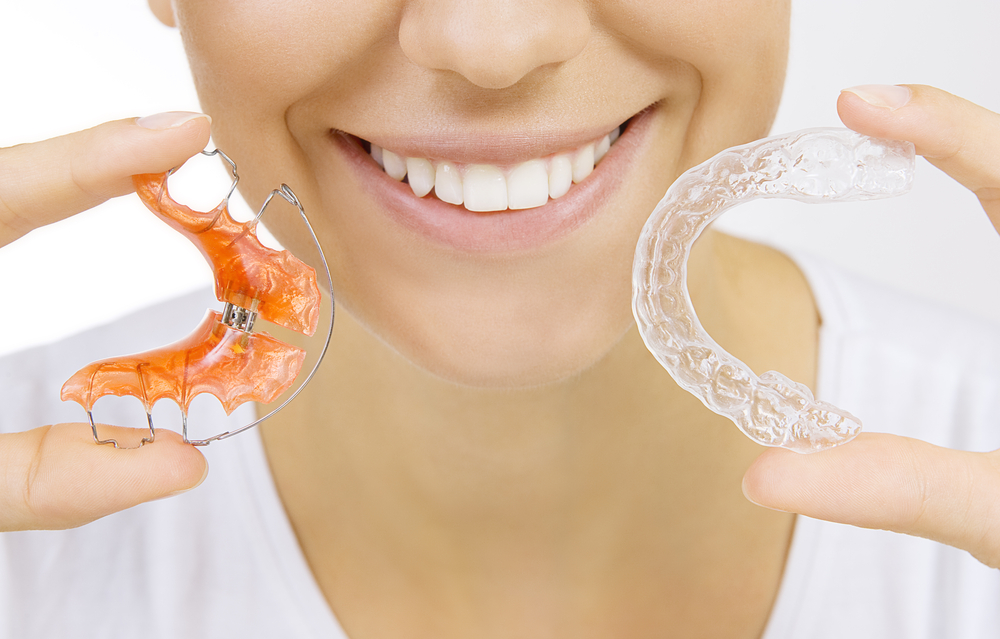Maintain Your Beautiful Smile With Retainers
After braces or Invisalign® treatment to straighten teeth, a retainer program is crucial in maintaining the straight teeth you worked hard to achieve. Retainers are orthodontic appliances that hold teeth in their proper position after treatment with braces. These appliances come in different types, including removable and fixed, and require usage and maintenance to ensure long-lasting results.
Dr. Stephen Grussmark, our premier orthodontist in Miami, recommends wearing retainers to maintain your results. We welcome patients in Key Biscayne, Miami Beach, and Coral Gables, FL, to learn more by calling (305) 441-1200.

Types of Retainers
Removable Retainers
As the name suggests, removable retainers can be taken in and out of the mouth. They’re typically made of clear plastic or acrylic and fit over the teeth. Removable retainers are easy to clean and can be adjusted as needed. They’re a good option for patients who prefer a retainer that can be removed for eating or other activities.
Common removable retainers include:
- Hawley Retainers: These retainers are made of a combination of metal wire and acrylic and fit over the teeth.
- Clear Aligner Retainers: These retainers are similar to clear aligners used in orthodontic treatment, and they’re made of transparent plastic material that fits over the teeth.
Fixed Retainers
Fixed retainers are attached to the back of the teeth using dental adhesive. They’re made of a thin wire that runs along the inside of the lower or upper teeth. Fixed retainers are a good option for individuals concerned about losing or forgetting to wear their retainer, as they’re always in place and require no additional maintenance.
However, fixed retainers can be more difficult to clean than removable retainers, and they may require more frequent dental checkups to ensure that they’re working effectively.
Common types of fixed retainers include:
- Lingual Retainers: These retainers are bonded to the back of the teeth using a dental adhesive and consist of a thin wire that runs along the inside of the teeth.
- Bonded Retainers: These retainers bond to the back of the teeth using a dental adhesive and consist of a small wire that runs along the inside of the lower or upper teeth.
How Do I Care for My Retainer?
Caring for your retainer is vital to maintaining good oral hygiene and ensuring that your retainer stays in good condition. Our orthodontist has provided some tips on how to best care for your retainer:
- Clean Your Retainer Regularly: To keep your retainer clean and free of bacteria, it’s important to clean it regularly. You can use a soft-bristled toothbrush and non-abrasive toothpaste to gently brush your retainer or soak it in a retainer cleaning solution.
- Keep Your Retainer in a Safe Place: When you’re not wearing your retainer, store it in a safe place, such as a retainer case. This will help protect your retainer from damage and prevent it from getting lost or misplaced.
- Don’t Expose Your Retainer to Heat: Retainers can warp or become damaged if exposed to heat, so it’s crucial to avoid leaving them in direct sunlight or exposing them to hot water.
- Avoid Eating or Drinking with Your Retainer: To prevent damage to your retainer and maintain good oral hygiene, it’s best to remove your retainer before eating or drinking anything other than water.
Frequently Asked Questions
The cost of orthodontic retainers can vary depending on the type of retainer prescribed by your orthodontist, the location of the orthodontic practice, and whether you have insurance coverage. Contact your insurance provider to learn more about your plan’s coverage.
Retainers can take time to get used to, and some people may experience discomfort during the first few days of wearing them. However, most people find retainers aren’t uncomfortable to wear, and they quickly adapt to wearing them as part of their own lives and daily routines.
The time you need to wear a retainer will depend on your orthodontic needs. In general, most orthodontists recommend wearing retainers for at least 12 months after the braces are removed and then wearing them on a part-time basis indefinitely to maintain the results achieved by orthodontic treatment.
Remove your retainer before eating or drinking anything other than water. This will help to prevent damage to the retainer and ensure it stays clean and hygienic. After eating, brush your teeth and clean your retainer before putting it back in your mouth.
Invest in Your Healthy Smile With Retainer Wear from Dr. Grussmark
If you need a retainer or have questions about how to care for your current retainer, don’t hesitate to contact Dr. Grussmark. Our Miami orthodontist can provide specific guidance on which type of retainer is best for your needs, as well as instructions on how to care for your retainer to ensure that it stays in good condition and remains effective.
Call our office at (305) 441-1200 or fill out our online contact form to schedule your consultation today.

